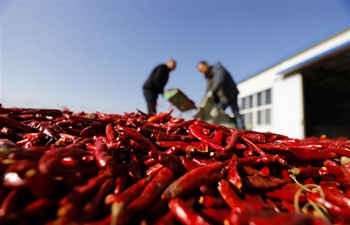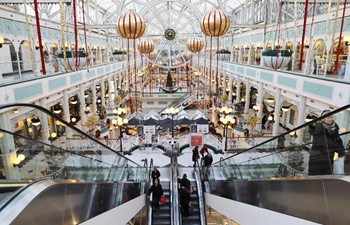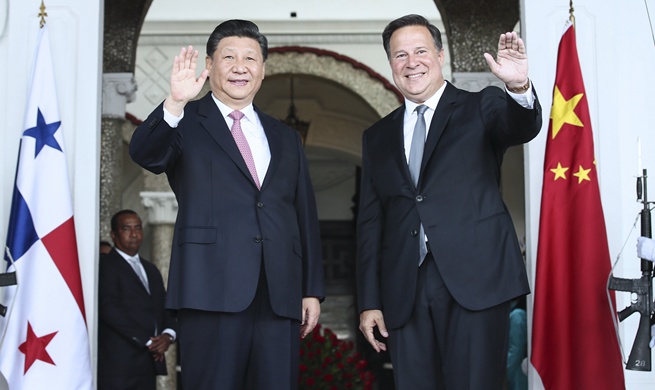PARIS, Dec. 4 (Xinhua) -- Under fire of social rebellion, French President Emmanuel Macron, struggling to regain the initiative, on Tuesday backed down on higher fuel tax's plan, proposing a six-month suspension of the due tax to defuse widespread demonstration that had triggered unprecedented violence the weekend.
In a televised address, Prime Minister Edouard Philippe announced that the tax, set to come into effect on Jan. 1, will be suspended until June 2019, in addition to the suspension of planned rise in power and gas prices in order to alleviate the burden on France's squeezed middle-class households.
"This anger, you'd have to be deaf or blind not to see it or hear it," the Prime Minister said.
The six-month moratorium would be used to launch talks with the concerned parts "to identify and implement fair and effective measures," to help the working-class citizens to switch to environment-friendly vehicles.
"The French who have donned yellow vests want taxes to drop, and work to pay. That's also what we want. If I didn't manage to explain it, if the ruling majority didn't manage to convince the French, then something must change," the prime minister added.
"Defining course and maintaining it is a necessity to govern France, but no tax deserves to jeopardize the unity of the nation," he stressed.
President Macron's first retreat on a major policy since taking power in 2017, came after protests across French cities notably in Paris turned particularly violent at the weekend, with the Arc de Triomphe vandalized and avenues off the capital's Champs Elysees were damaged.
Without making any commitment to increase the minimum wage, the French Prime Minister planned to launch a "large debate on taxes and public spending," by mid-December that "should lead to concrete solutions" in terms of taxes which according to him are "the highest in Europe."
TOO LATE, NOT ENOUGH
To Eric Drouet, one of the movement's representatives "all "Yellow Vests" do not agree at all with the announced measures," saying streets action "will continue until there are real changes."
"The government is very late on what is happening on the ground. it's not possible to wait that long time before acting," he told BFMTV news channel.
"These measures have not convinced. The only announcements we have are suspension or tax freezes," he said, adding that the movement wanted the tax cancellation.
While the Prime Minister rose the curtain on "measures of appeasement," protests continued. "Yellow Vests" blocked access to a major fuel depot in the port of Fos-sur-Mer, near Marseille, in southern France and petrol stations across the country have run out of fuel.
High-school students that oppose changes to colleges and the university system, seized on the mood of the movement to step up blockades of many schools across French cities where violent clashes have been reported in Lyon, Marseille, Bordeaux and Paris region.
In Balgnac, southwest France, they set a part of the Saint-Exupery high school on fire.
The NL-SD, high school students organization planned a "black Tuesday" on Dec. 11, arguing that "the moratorium on the increases of carbon tax is not sufficient."
Started on Nov. 17, the "Yellow Vests" movement, began as a protest against a rise in fuel tax which Macron says is necessary to combat climate change.
They have since turned into a bigger uprising denouncing a squeeze on household spending, high living costs caused by the president's fiscal and economic policy which they say favors the rich. Some of them asked Macron to step down.
"These decisions should have been taken from the beginning of the conflict which becomes quite hard (to manage) due to the rage, the exasperation of people, notably pensioners...More you let the situation deteriorates, more you have to let go in return," former Socialist ecology minister Segolene Royal told Radio Classique.
On social media, "Yellow Vests" supporters have already been coordinating to stage more nationwide blockades on Saturday, for the fourth weekend in a row, that may paralyze the eurozone's second power and world's top tourism destination during Christmas festivities.
ON THE HOT SEAT
Upon his inauguration in May 2017, Macron pledged that his first mission would be uniting the French people, facing all challenges and getting the country out of crisis.
Since then, he had been changing labor code and pension, proposing to inject dynamism into public services and institutions and reforming rail sector and education system, areas where he was facing fierce opposition that drew thousands to the country's streets in addition to rolling strikes.
His latest reform to speed up energy transition and protect environment has created a tense social climate that could turn the tide against the 40-year-old president.
For Macron, a decision to bow to streets pressure and shift the course would pose further risk and cast doubts into his ability to put on the ground economic and defend liberalism and progressive approach ahead of European Parliament elections next May.
An ifop poll released on Tuesday showed Macron's approval ratings at 23 percent, reaching his record low score since May 2017, pulled down by the social rebellion.
Support for the far-right under Marine Le Pen rose by 5 percentage points to 35 percent, positioning the anti Europe party as the country's main opposition.
Furthermore, the proposed moratorium on fuel tax is estimated to cost the government at least 2 billion euros (2.26 billion U.S. dollars), according to local media.
A plan worth 500 million euros was announced last month, mainly to double a 2,000 euro bonus granted to motorists on low incomes who change old-model cars for cleaner ones.
To pay the bill, the government will be forced to squeeze public expenditure to compensate the extra-spending, while the week-long unrest had put the country's economy in tatters, causing major disruption in retailers activities, restaurants and hotels during Christmas festivities.
"For France, the impact of social unrest on growth dynamics is the point that should be addressed now," Philippe Waechter, director of economic research at Ostrum Asset Management, wrote in a note.
Waechter warned that the "Yellow Vest" blockades of access to shopping centers would affect households consumption and business investment, the country's two growth engines, and that could stagnate economic activities in the last quarter of the year after it had reported wane performance during the previous quarters.
"So, the average growth for 2019 would be only 1 percent. It would then be very low from the target of 1.7 percent as projected ...for 2019. This would then result in a public deficit beyond 3 percent," he said. (1 euro = 1.134 U.S. dollars)













